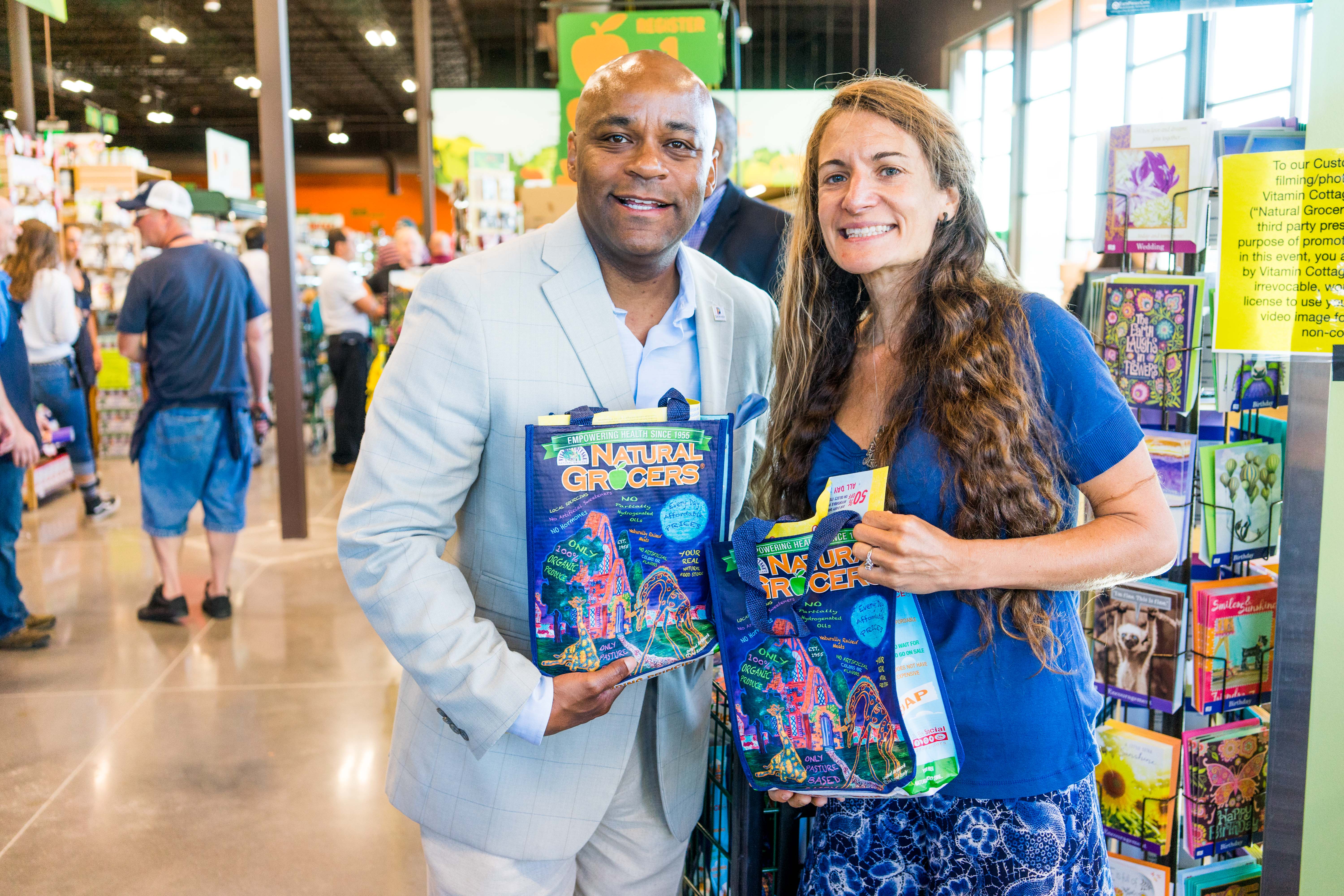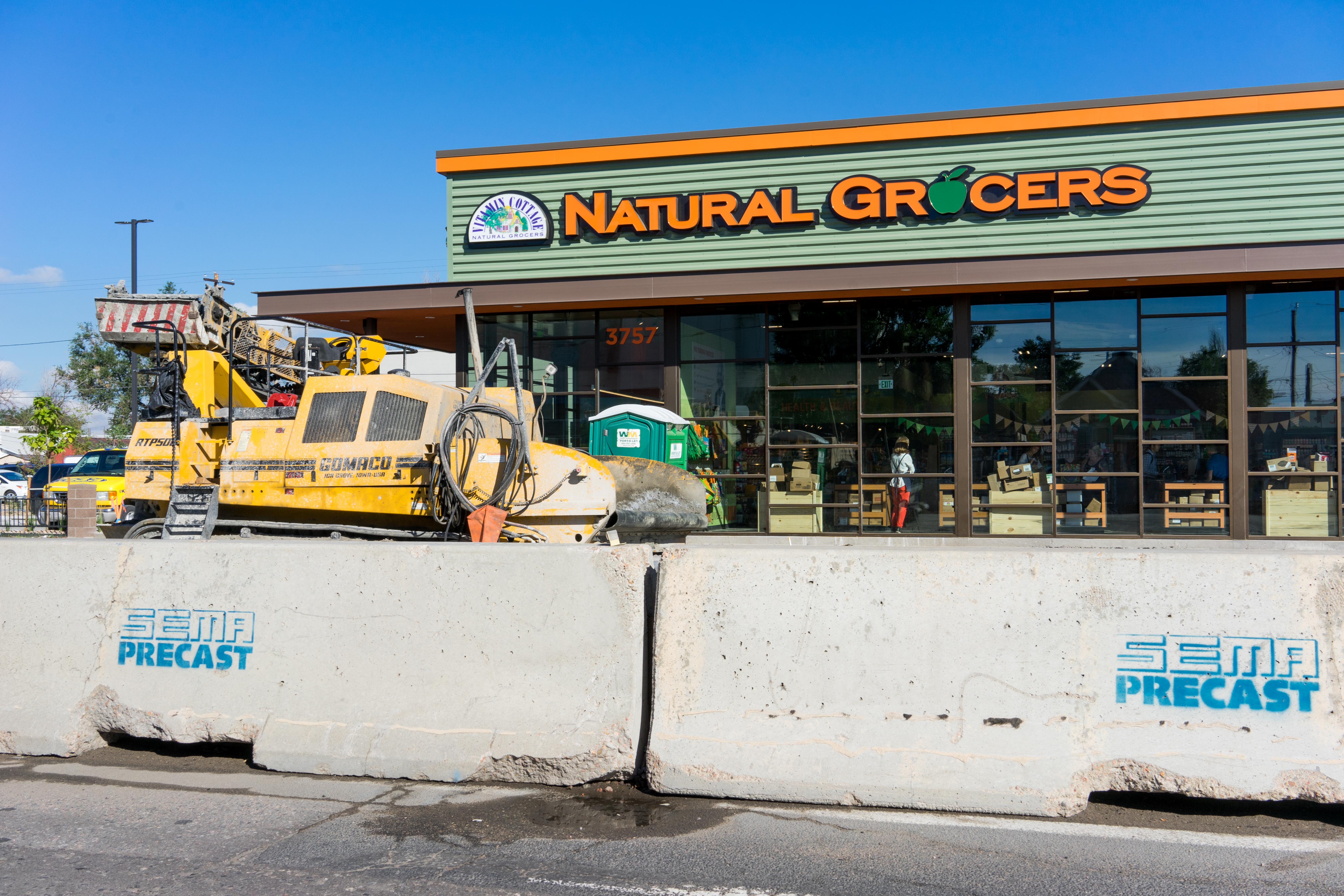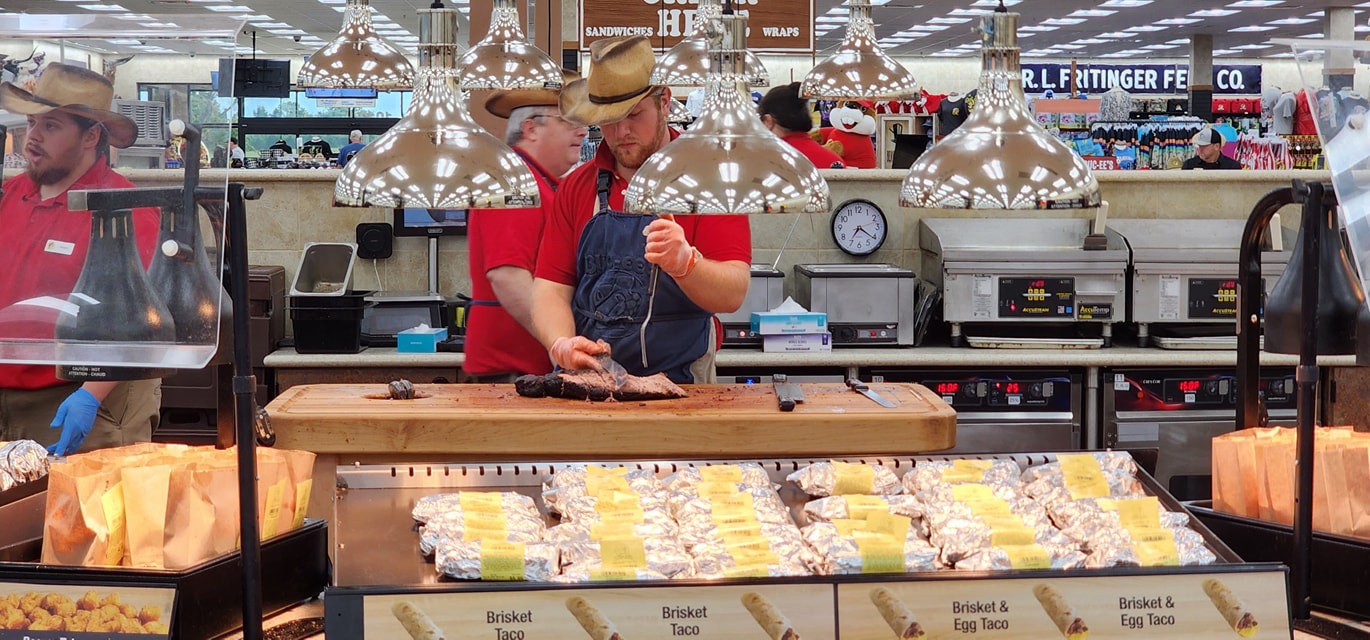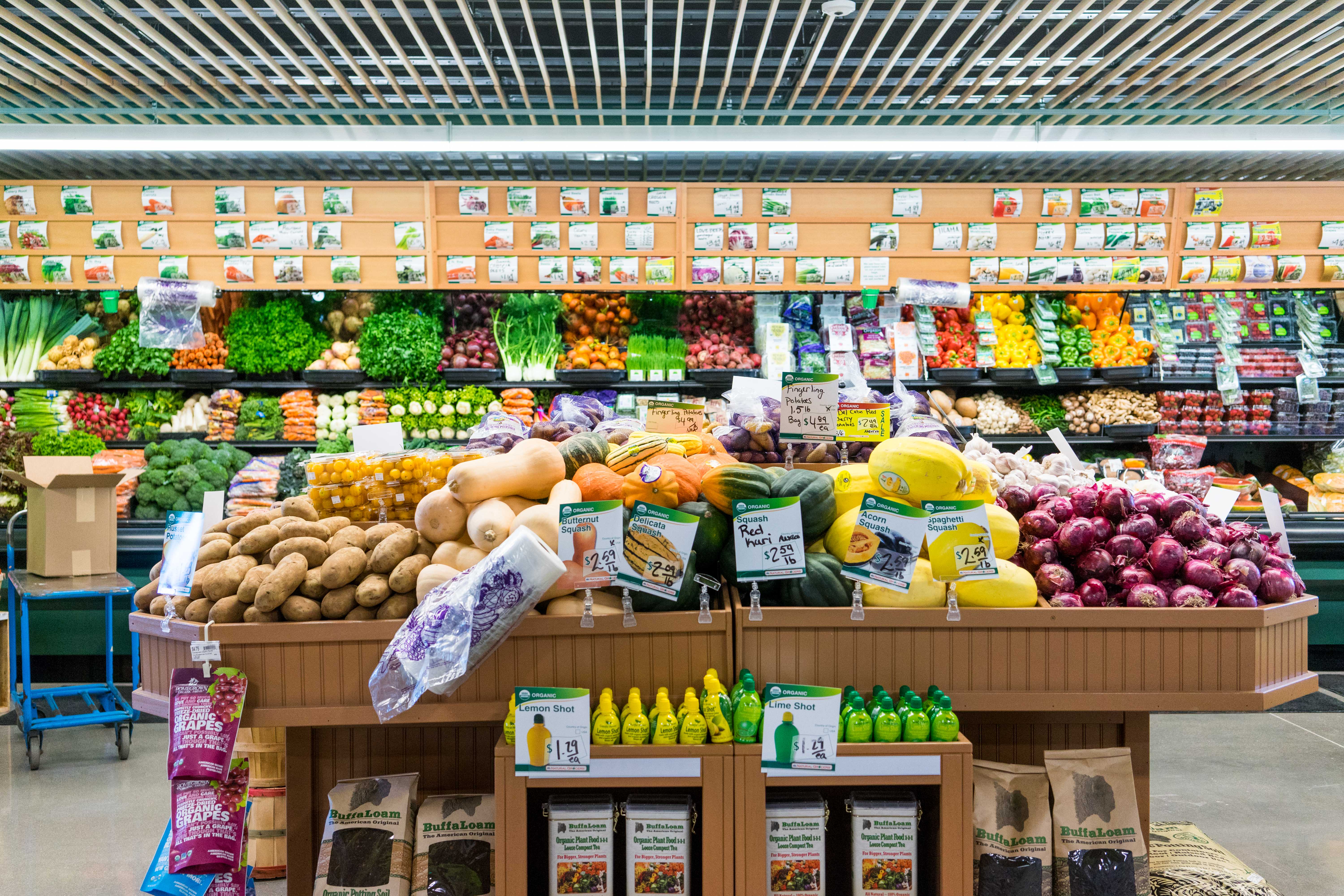When Candi CdeBaca returned to live in her childhood home in the Globeville Elyria-Swansea area of Denver, a lot had changed in her life. She had overcome the challenges of growing up poor, earned a bachelors and masters degree from Denver University and even started her own nonprofit called Project VOYCE that trains, employs and organizes youth from underserved areas of Denver. But despite all the changes she’s seen in her life, not much has changed for her neighborhood. In particular, access to healthy eating continues to be a huge barrier — just as it was for CdeBaca.
“My mom was on welfare, so we got food stamps. So there were a bunch of barriers to healthy eating, but one of them was we didn’t live close to a grocery store,” she said. As a result, she often found herself eating incomplete and cheap meals.
“When I got a job at 14, I would try to stretch my money so I literally ate a $1 cheeseburger and $1 fry everyday,” she said. Today, many of the kids she works with share similar stories, including one teenager who admitted to never drinking a full glass of water in her life — just juice or soda.
“My staff was blown away because I told them I was exactly the same. I didn’t drink a glass of water until I was in college,” said CdeBaca.
Like many kids she encounters today, she was suffering from a poor diet. She didn’t realize it until she got to college and finally had access to a healthy one. “I gained 45 pounds,” she said. “When I look back on pictures of myself, I was skin and bones.”
Despite the similarities between CdeBaca’s experience and kids she meets today, there is one difference in the Globeville neighborhood — there’s now a nearby grocery store.
The Grocery Store

A Symbol Of Gentrification

Proposed Solutions
Two of the people Lewis has been meeting with from the start include Gallegos with the GES Coalition and Armando Payan. Like Gallegos, Payan is a resident of the Globeville area and an active community member. Both agreed to discuss the store with Lewis back in 2015. Their discussions have mainly revolved around how to better connect the community with the store. Both men have described Lewis’ involvement as positive and proactive and have been vocal and open with him about their concerns.
As Payan explained, making the neighborhood feel welcomed can make a huge difference. He suggested creating a part of the store where the residents may feel invited by providing discounted items that resonate with the majority Latino population and maybe adding Globeville to the name of the store.
“The way you are going to change people’s minds is to make it appealing and attractive,” said Payan. “Change the name. Add a mural. Those would be simple changes that would make a huge difference. Something to bring in some neighborhood awareness.”
Gallegos has echoed some of these sentiments and has discussed taking the cooking class he teaches at Garden Place Elementary to Natural Grocers so kids can get more exposure to fresh fruits and vegetables.
But so far none of the suggestions have made their way into the store. Now, months after opening, many including Payan and Gallegos are concerned that what Natural Grocers offers is largely talk.
“There are no discounts for [the] community, still no community interest areas in the store and there still has not been any change in the store as far as prices or community outreach,” said Gallegos in an email exchange last week.
But Lewis explained that the way Natural Grocer intends to help is by being a resource for the community and bolster other ongoing projects. For example, Gallegos speaks of wanting to open a farmer’s market in Globeville and expand his cooking class. Lewis said that he could help by giving them more access to the store’s educational space and potentially connecting some of their suppliers to provide cheaper products to the farmers market. Lewis calls this “catalyzing the right idea at the right time” and points to the success he has had with small producers he has supported like Cottonwood Creek Farms as a good example. Lewis has also had conversations about working with other community organizations like The Growhaus, but like the GES, nothing has come to fruition yet.
Overall Natural Grocers strategy is to focus primarily on outreach outside of the store and they appear to be unwilling (or at least slow-moving) to find more robust ways to invite these low-income families within its walls. For the neighborhood, this, in particular, continues to cement the idea that the Natural Grocers is not for them, nor was it ever intended to be. Even Payan, who’s been the most optimistic and open about the store has called its lack of effort “disappointing.”
Lewis argues that while the store offers a lot of opportunities, it’s not how the food desert issue will be resolved. “It’s not a full solution to a fundamental economic problem in the country,” said Lewis. “We’re doing our part, but we can’t do it on our own.”
While it’s debatable if Natural Grocers is currently doing its part to support the neighborhood, it is true that the burden to fix the neighborhood’s food desert problem shouldn’t be placed solely on them. And fortunately, it’s not.
The Future: Denver’s Food Vision
Two years ago, the city created a new position called the manager of food system development for the Office of Economic Development. That long, clunky title belongs to Blake Angelo, a former consultant who has worked with everyone from Colorado State University to Kaiser and the City of Boulder to develop grants and provide research-driven plans to support local food systems. Angelo’s current job to put forth a plan to create a better Denver food system by improving how food in Denver gets from farmers and ranchers to individuals and families.
In 2016 a baseline report of Denver’s food system was developed to identify trends and challenges the food system might face, and now the office the released its food vision that lays out a what the city hopes to achieve when building Denver’s food system. The 36-page document essentially explains the city hopes to create a more inclusive, diverse food system that streamlines how healthier and local foods get to the people of Denver. Eventually, this vision will turn into an action plan that will be released by the end of this year, detailing how they will achieve this goal. Currently, some of the projects are underway and focus on the areas with the most need, including Globeville. Many of those projects are more grassroots and work with corner stores to get fresh fruits and vegetables in the aisles and programs like Uncharted which works with companies like Eat Five, which provide Globeville with produce boxes, to help improve food access in the area.
But alongside these grassroots initiatives, there was also a goal to bring a grocery store to food deserts in Denver. The city has even secured $3 million to do so (which some argue is not enough). But when we spoke with Angelo and Lewis, neither could confirm that they met to discuss Natural Grocers opening in the area. The city said the store never reached out, and Lewis explained the store didn’t need funds.
But despite the lack of communication, a lot of their projected initiatives line up. Natural Grocers is a long-time supporter of organic and local produce and is known to take small local producers and help them sell directly to local customers. Even its five founding principles read exactly like the issues that the city is trying to solve in its Denver food plan. Mayor Michael Hancock even commented on the day of the grocery store opening that he hopes the store becomes a resource for the area.
“I hope that it not necessarily changes Globeville for the worst, but it changes it for the good … It has been a food desert, particularly when it comes to healthy foods, and I think when you find neighborhoods that have been perennially overlooked and neglected typically you find if there is food there it isn’t very healthy. So I think Natural Grocers is a natural fit for this area to help quite frankly add the healthier options that we all need. So I am excited about what this will bring to this area of town. For all residents that live here.”
According to both parties, no partnerships have been formed yet, but they are now in contact.
As a result, the relationship between the city and Natural Grocers, as well as the neighborhood, sits in limbo. For those in the affected community, the sentiment that the store is not there for them continues to grow. This only further drives a wedge between an area that, as the mayor explains, has been perennially overlooked. As it stands, a grocery store, which should be an oasis in a food desert, has become a symbol that gentrification is not on the horizon — it’s already planted its roots.






The only problem is the expense of shopping at natural grocers. It’s not like the neighborhood occupants are rolling in cash. Way to bring the high prices in. And make no mistake, natural grocers is at 38th and Brighton because of the new apts/ condos that have been or are being built in the area, with people who can afford to shop there, not because they felt sorry for the poorer folks in the area just east of Washington Street or North of 38th, you know, the original neighborhood!
If you can’t afford a glass of water, you certainly can’t afford to shop at Natural Grocers.
Allowing your kid to drink juice and soda their whole life instead of water is not the result of poverty, it’s the result of bad parenting.
Agreed~ water is FREE. I see a lot of very overweight people in Globeville. You can buy healthier food if you cut down your portion sizes, and leave out chips and soda. As Candi mentioned, she was eating a cheeseburger and fries *every day* and was still bone thin. Some that I see don’t seem to care about health much, pushing a stroller while smoking a cigarette.
The problem nobody wants to talk about with gentrification is that property values near city centres were severely undervalued after the “white flight” to the suburbs. Now that living near city centres is becoming more desirable, property values are rapidly normalizing, which, unfortunately, can price out lower income current residents. I get that it’s frustrating to get priced out of “your” neighborhood. However, there is no way to stop the market normalization. With a lack of housing near the city center, the prices will only continue to rise. Long-term residents may not like the newcomers but surely they like the 50% appreciation on their home values over the last 10 years. If the new character of the hood is that unbearable, people can cash out and move. And the suggestion that Natural Grocers, a private business, offer discounts to “locals” is preposterous. Why won’t people talk about why food deserts exist in the first place? It’s because of low profitability in lower income neighborhoods. Loss due to higher rates of theft with significantly less high margin “convenience buys” makes it untenable. What’s the solution to that? More public money or forcing a private business to forgo profits? Creating a change in low income grocery shopping habits? Not going to happen. Denver has been trying for years to lure a grocer into Montbello with no success. Sidewalks and grocery stores follow the money. The residents of Globeville should borrow on their newfound equity and open their own low-cost co-op. Capitalize on the rapid appreciation in home values instead of complain about it.
Excellent points, Brent. I wish we had a GrowHaus-type operation in Globeville. I was also shocked at the mention of giving locals reduced cost groceries. We need to get people off of welfare, rather than keep lowering the bar to make sure more people dependent on it. Many lower income people don’t seem to care about eating healthy or portion control. And more lower-income people smoke, which as we ALL know now in 2017, is extremely unhealthy for you and everyone around you. You have to care, first. I think reducing portion sizes will afford you a better shot at healthier groceries, but you have to want to change your view and lifestyle. And I say this as a person living below the poverty line.
All Natural Grocers “outreach” is meant to fund the Iselys obscene Cherry Creek McMansion. I remember bagging their biweekly $700 grocery purchases at the Colorado & Evans location and loading it in the back of their car in the snow while I was making roughly that amount each paycheck. Gentrifying scum that pontificate over the poor about their “bad choices” to peddle organic, woo nonsense are tools.
I am truly tired of hearing about how the city forgot about Globeville. Now that attention is being paid to this neighborhood, it’s never enough. There are other neighborhoods that would love a grocery store. One gets built in Globeville and it’s a pariah. Why? Oh the prices are too high or there was no outreach to the neighborhood to offer ethnic choices or discounted foods. Give me a break already. This neighborhood has languished because its residents have chosen to live this way. I’ve been in this neighborhood, I’ve seen how its residents live here. You’re poor? Well I ain’t so damn rich either. Get an education. Learn to speak English and take pride of yourselves. Embrace your heritage and enrich it by becoming a part of the American society. Stop feeling sorry for yourself and expecting everyone else to follow suit. My grandparents stepped off the boat from Italy generations ago and were able to lift themselves up to make something of themselves even in the face of abject poverty and outright bigotry. I’m tired of the constant whining.
Natty G’s sucks.
I have lived in the area for about four years… Natural Grocers was quite possibly the worst choice of grocer to move in. The vegetables are usually starting to rot on the shelf and half the store is nonsense vitamins. No one shops there because it sucks, not because “waaah gentrification”.
Their coffee selection is absolute dog-sh*t. There are dozens of GREAT coffee roasters around town and all NG seems to carry is Ash Tray Dark Roast from bum-f*ck Nebraska. No thanks.
Better than nothing? Perhaps… but it’s a far cry from what we need around here. Shop the Downing Super if you want the real neighborhood experience. It sucks too but at least it’s legit.